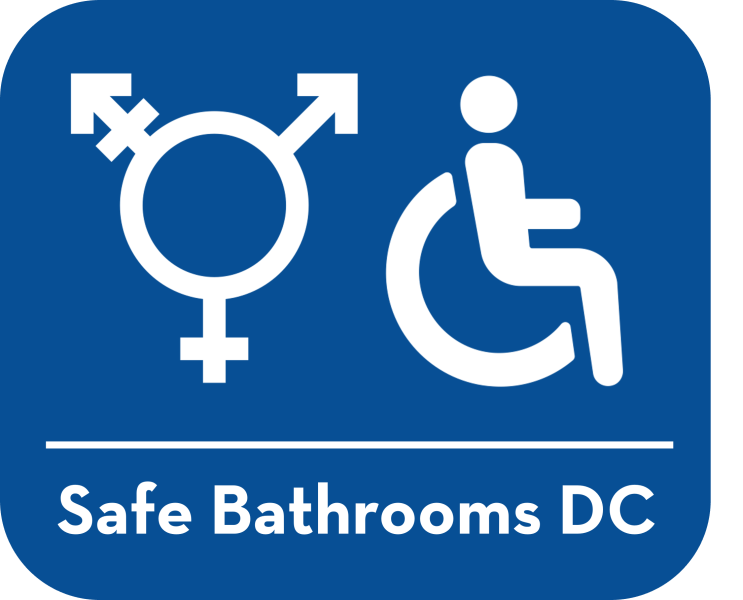
What Is Safe Bathrooms DC?
Public bathrooms are never enjoyable, but for transgender people and many others, using a public bathroom can be a highly stressful and even dangerous experience. In the District of Columbia, we are attempting to reduce that stress by making every single-stall public bathroom in the District gender-neutral. It’s the law, D.C. Mun. Regs. tit. 4. § 802.2 (2006), but many businesses are unaware of the requirement, and we need your help to let them know.
Starting in 2014, individuals who saw a single-stall public bathroom that is not gender-neutral were able to tweet us the business name and location using #safebathroomsDC, or fill out our five question form. This is still ongoing, but to celebrate 10 years of this, we are revamping and updating all our materials. Please look below for resources.
Why Aren’t Businesses Already Following the Law?
The topic of gender-neutral bathrooms has been a hot-button issue across the country in the last several years, however, in Washington, DC most business owners whose establishments have single-stall bathrooms labeled “men” or “women” do not mean any harm. Most are simply unaware of the regulations or the effect gender-specific stalls have on particular people and are happy to make the bathrooms gender-neutral when notified. Additionally, until early 2013, conflicting regulations surrounding the labeling of single-stall public bathrooms created confusion among some business owners, and prevented OHR from being able to fully enforce the regulations. Despite the regulations now being aligned to require single-stall bathrooms to be gender-neutral, many businesses might need a reminder of this law.
To make a single-stall bathroom compliant, all that is needed is a sign that says “Restroom,” or something similar, to indicate it is gender-neutral.
Why Does Gender-Neutral Matter?
Bathrooms without a designated gender benefit a variety of individuals who are not comfortable or who face mistreatment when accessing gender-specific bathrooms. This includes:
-
Transgender and Gender Non-Conforming People
-
Transgender and gender non-conforming people often face stress, anxiety and mistreatment when accessing the gendered bathroom that is appropriate for them. Providing access to a private, non-gendered stall can reduce or even eliminate this burden.
-
-
People with Disabilities or Personal Attendants
-
People with disabilities or others who have personal attendants of a different gender can run into problems when accessing gendered bathrooms. Gender-neutral bathrooms can provide a more welcoming and comfortable situation for two people of different genders.
-
-
People with Children
-
Parents or guardians with children of a different gender can encounter misunderstanding when accessing gender-specific bathrooms. This easily can be addressed with a gender-neutral bathroom.
-
-
Everyone
-
We've all waited outside an occupied bathroom while the bathroom for the gender we don't identify with was empty. Gender-neutral bathrooms are more efficient, allowing you to avoid that unnecessary wait.
-
What Can I Do?
If you see a single-stall public bathroom at a restaurant or business, let us know and we will notify the business owner or manager to make sure it gets changed! There are three simple ways you can let us know:
-
Tweet us the name of the business, its location, and ideally a photo of the bathroom door using the hashtag #safebathroomsDC. You can also add our X/Twitter handle: @dchumanrights
-
Submit a quick online form on our website
-
Call our office at (202) 481-3773 and ask to submit a bathroom complaint
We will notify the business their bathroom(s) needs to be gender-neutral and follow-up to make sure it happens!
If you feel that you have been discriminated against for using a bathroom or another service at an establishment, you will want to file a complaint of discrimination or contact us at [email protected] or call us at (202) 481-3773.
Campaign Advertisements
The campaign advertisements lighten the mood on a serious topic by showing challenging or frustrating bathroom situations with the tagline: "Public bathrooms are challenging enough: Help make them a little bit easier for." To see a larger version of each ad, just click!
Additional Resources
Please visit our LGBTQIA+ Resource Portal for more resources and information!






